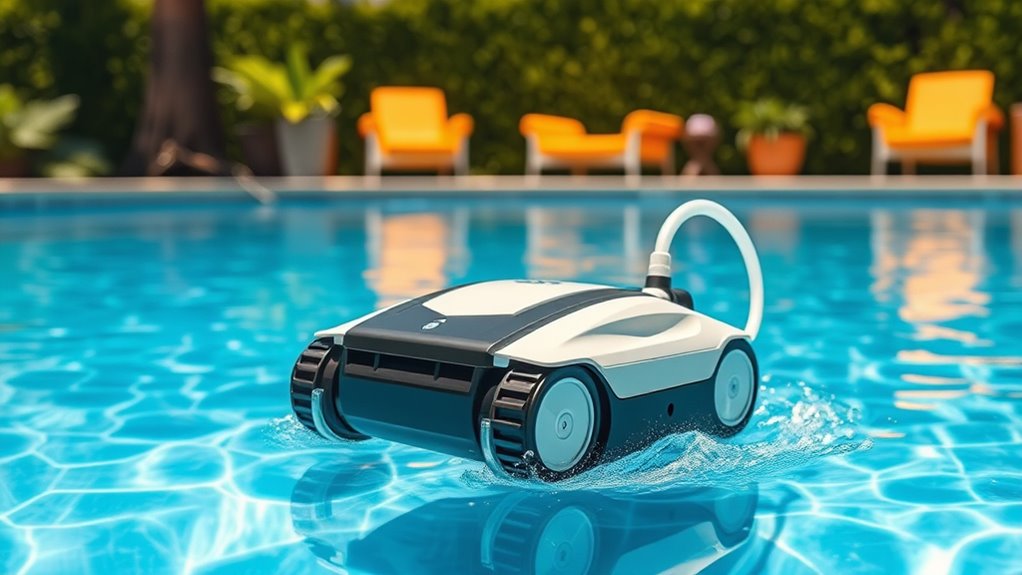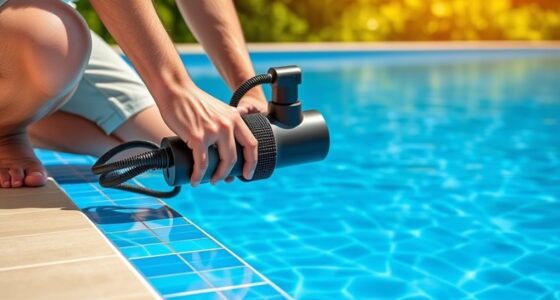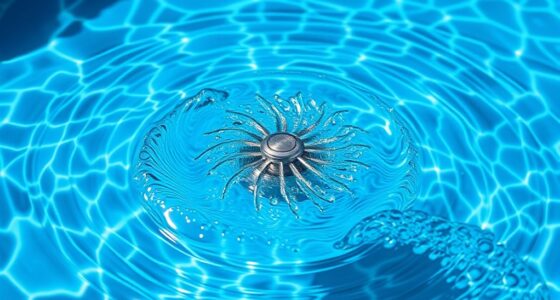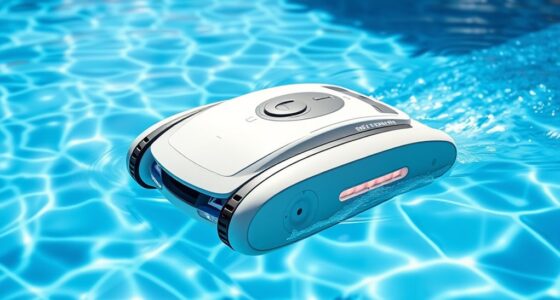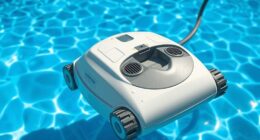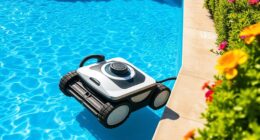A suction pool cleaner can be a cost-effective and efficient way to keep your pool clean, especially if your pool isn’t too large or irregularly shaped. It connects to your pool’s skimmer or dedicated suction line and uses your pump to filter out dirt and debris. However, it may struggle with maneuvering complex shapes or tight corners. To determine if it’s the right fit, consider your pool size, surface, and layout — there’s more to explore below.
Key Takeaways
- Compatibility with your pool’s filtration system and skimmer setup is crucial for effective operation.
- Suitable for small to medium-sized pools with simple shapes; complex layouts may pose coverage challenges.
- They are a cost-effective and low-maintenance option compared to robotic cleaners.
- Proper chemical balance and surface type influence cleaning efficiency and equipment longevity.
- Consider noise levels and pool location to ensure the cleaner operates quietly without disturbance.
How Suction Pool Cleaners Work and Their Key Features

How do suction pool cleaners effectively keep your pool spotless? They do this through powerful water filtration that removes debris and dirt from your pool surface. As the cleaner moves, it uses suction to pick up leaves, bugs, and grime, preventing buildup. It connects to your pool’s skimmer or dedicated suction line, utilizing the existing pool pump to generate the necessary suction power. This process helps maintain the proper balance of pool chemicals by reducing organic material that can cause algae growth or cloudy water. Additionally, many models feature automatic navigation capabilities that enable comprehensive cleaning coverage without manual intervention. Unlike manual cleaning, suction cleaners operate automatically and consistently, ensuring your pool stays clean with minimal effort. By constantly filtering water and removing contaminants, they help keep your pool water clear, healthy, and ready for use. Proper maintenance of the filtration system can also maximize the efficiency of your suction cleaner and extend its lifespan, ensuring long-term performance and reliability.
Advantages of Using a Suction Pool Cleaner
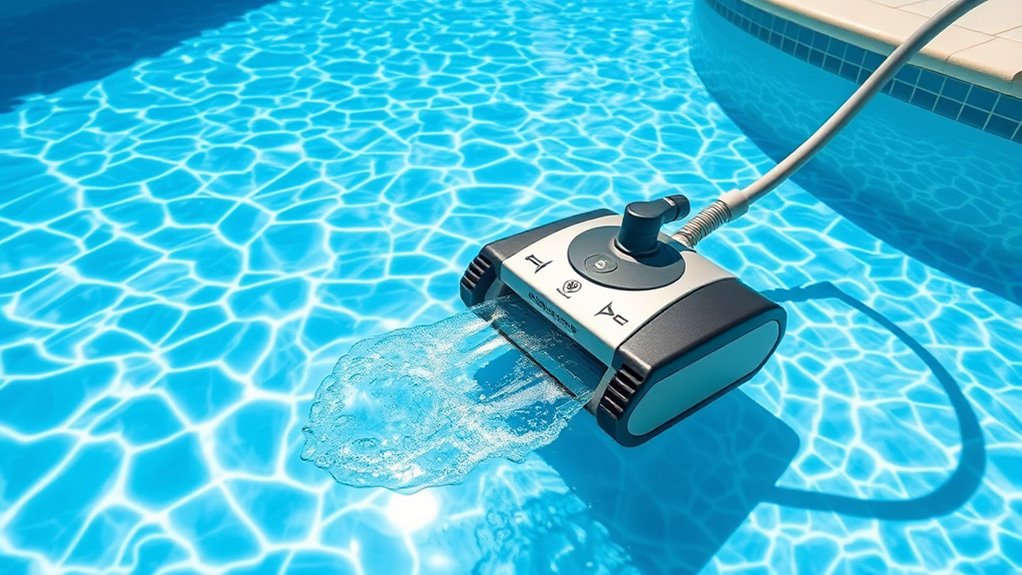
Using a suction pool cleaner offers several key advantages that make maintaining your pool easier and more efficient. First, it helps keep your water clean by consistently removing dirt, leaves, and debris, reducing the need for frequent manual skimming. Second, it minimizes the impact on pool chemicals, helping you maintain proper water chemistry without overuse. Third, it adapts well to varying water temperatures, ensuring effective cleaning regardless of seasonal changes. These cleaners operate quietly and require minimal supervision, saving you time and effort. Additionally, they help prevent algae buildup and maintain a healthier swimming environment. Proper pool maintenance can serve as a reminder of the importance of regular cleaning routines and equipment upkeep. Implementing a simple, effective cleaning routine further enhances water quality and extends the lifespan of your pool equipment. Overall, a suction pool cleaner simplifies upkeep while supporting ideal water quality and chemical balance.
Limitations and Challenges to Consider

While suction pool cleaners are effective, they can face navigation and coverage issues, leaving some areas uncleaned. Compatibility with your pool’s shape and size might also pose challenges, requiring careful selection. Additionally, maintenance and occasional repairs can be time-consuming and may impact overall performance. Proper tuning and regular check-ups can help optimize their operation and longevity similar to ECU tuning in Honda vehicles, and understanding precious metals market demand can aid in making more informed investment decisions. Being aware of sound healing science can also provide insights into alternative holistic health practices that complement traditional cleaning routines. To ensure comprehensive cleaning, it’s important to consider the coverage capabilities of the cleaner and whether it suits your specific pool configuration.
Navigation and Coverage Issues
Are suction pool cleaners always able to navigate every corner of your pool effortlessly? Not quite. They often face navigation challenges that limit their coverage. This means some areas might be missed or cleaned less thoroughly. To understand this better, consider these points:
- Obstacles and Pool Shape: Complex pool shapes or obstacles like ladders can hinder movement, especially if the cleaner’s design isn’t adaptable to irregular spaces.
- Limited Coverage: Coverage limitations mean the cleaner might not reach all sections, especially tight corners, which can leave some debris unremoved.
- Navigation Challenges: These can cause the cleaner to get stuck or miss spots, reducing overall cleaning efficiency. Navigation difficulties are common with basic models lacking advanced sensors. Additionally, the pool layout can significantly influence how well the cleaner performs.
- Effective use of eye patch benefits can help maintain a fresh appearance around the eyes, but they do not influence pool cleaning capabilities. Incorporating automation technology in modern cleaners can help mitigate some of these navigation issues by improving movement accuracy.
While suction pool cleaners are great for basic cleaning, these navigation and coverage issues can be frustrating. Knowing these limitations helps you decide if this type suits your pool’s specific needs.
Compatibility and Maintenance Concerns
Compatibility and maintenance can pose significant challenges when choosing a suction pool cleaner, especially if your pool has unique features or equipment. An imbalanced chemical level can impact the cleaner’s effectiveness, causing it to clog or struggle with debris. Ensuring proper chemical balance helps the cleaner operate smoothly and reduces wear. Additionally, compatibility with your pool’s filtration system and skimmer setup is essential to avoid flow issues. Regularly checking and cleaning the filter and hoses can help maintain energy efficiency and prevent malfunctions. Some models may require extra effort to adapt to specific pool shapes or features. Proper environmental considerations can also influence the cleaner’s performance and longevity. Furthermore, understanding the causes and contributing factors of pool equipment issues can help in troubleshooting and maintaining optimal operation. Being aware of filter system compatibility can prevent installation problems and enhance cleaning efficiency. Adequate user training on the operation and maintenance of the cleaner can also significantly extend its lifespan and performance. By addressing these compatibility and maintenance concerns, you can keep your suction cleaner running efficiently and extend its lifespan.
Factors to Determine if It’s the Right Fit for Your Pool

To decide if a suction pool cleaner is right for your pool, you need to evaluate its size and surface type. Smaller pools may be easier to clean with this type, while larger ones might require more powerful equipment. Additionally, verify your pool’s surface is compatible, whether it’s concrete, vinyl, or fiberglass, for ideal cleaning results. Ensuring the cleaner is trustworthy and effective can help achieve optimal cleaning performance and longevity. You should also consider the cost and maintenance involved to determine if it fits within your budget and upkeep preferences. Considering the performance capabilities of different models can also guide your decision-making process. Being aware of regional availability of resources can ensure you have access to support and replacement parts when needed. Moreover, understanding the noise levels of various cleaners can be important if your pool is near living spaces.
Pool Size Compatibility
Determining if a suction pool cleaner is suitable for your pool starts with understanding its size capabilities. Your pool size directly impacts whether a cleaner can effectively cover the entire surface. Larger pools may require more powerful or specialized models, while smaller pools can often accommodate standard units. Additionally, consider surface material, as some cleaners work better on certain surfaces. To help, ask yourself:
- Is the pool size within the cleaner’s recommended capacity?
- Will the cleaner handle the surface material without damage?
- Does the cleaner’s coverage area match the size of your pool?
- Understanding home decor principles can also help in optimizing the pool area aesthetic and functionality.
Matching the cleaner’s specifications with your pool’s size and surface material ensures efficient cleaning and avoids frustration. Proper fit saves time and prolongs the lifespan of both your pool and the cleaner.
Pool Surface Suitability
Choosing a suction pool cleaner that works well with your pool’s surface is essential for effective and safe cleaning. Different pool surfaces, like tile, fiberglass, or vinyl, require specific cleaners to prevent damage. Some surfaces may be more delicate and need gentle suction, while rougher surfaces can handle stronger suction and more aggressive brushes. Additionally, consider the debris types your pool frequently collects. Fine dirt and sand demand a cleaner with fine filtration, whereas larger debris like leaves may require a stronger suction or a debris bag upgrade. Matching your suction pool cleaner to your pool surface and typical debris types ensures ideal cleaning performance, reduces wear on your equipment, and prolongs your pool’s lifespan. Proper selection makes pool maintenance more efficient and less stressful.
Comparing Suction Cleaners to Other Pool Cleaning Options
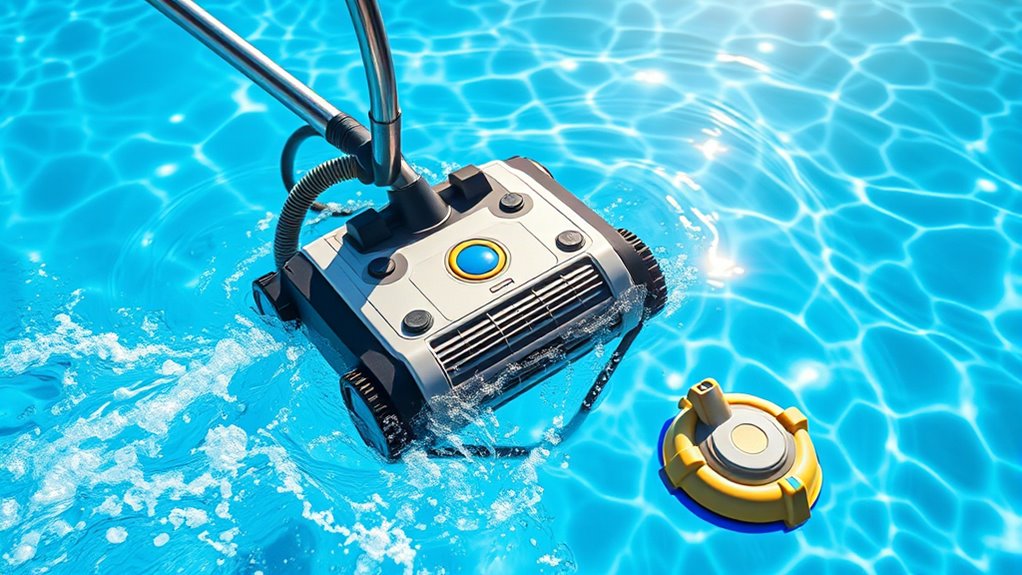
Suction pool cleaners are popular for their affordability and simplicity, but they do have limitations compared to other options like robotic or pressure-side cleaners. While they can keep your pool clear, they may not optimize pool aesthetics or energy efficiency as well as alternatives.
Consider these differences:
- Robotic cleaners offer thorough cleaning with minimal effort, often improving pool aesthetics more effectively.
- Pressure-side cleaners require less energy and cover larger areas quickly, making them more energy-efficient.
- Suction cleaners rely on your pool’s pump, which can increase energy use and sometimes leave spots uncleaned.
Choosing the right cleaner depends on your goals—whether it’s maintaining pool aesthetics or conserving energy.
Tips for Maintaining and Optimizing Your Suction Pool Cleaner

To keep your suction pool cleaner working efficiently, regular maintenance and proper adjustments are essential. Check and clean the filter regularly to prevent clogs, and ensure the hose connections are secure. Adjust the water flow if the cleaner isn’t covering the pool evenly. Maintaining proper pool chemicals keeps algae and debris at bay, reducing strain on your cleaner. Be mindful of water temperature, as extreme heat or cold can affect the cleaner’s performance. Use the table below to help you stay on top of maintenance:
| Tip | Benefit |
|---|---|
| Clean filters weekly | Improves suction power |
| Check hose connections | Prevents leaks |
| Adjust water flow | Ensures even cleaning |
| Maintain proper chemicals | Reduces debris buildup |
| Monitor water temperature | Keeps cleaner functioning smoothly |
Frequently Asked Questions
How Much Does a Suction Pool Cleaner Typically Cost?
When considering how much a suction pool cleaner typically costs, you should do a price comparison to find the best deal. These cleaners usually range from $100 to $400, depending on features and brand. Keep in mind maintenance tips like regularly checking the hose and filter to keep it running efficiently. Budgeting for these costs helps guarantee your cleaner stays effective and lasts longer, saving you money in the long run.
Are Suction Pool Cleaners Suitable for All Pool Sizes?
Think of your pool as a garden that needs tending. Small pools are like delicate flower beds, easily cleaned by suction pool cleaners, but larger pools are like sprawling fields. Pool size considerations matter because suction power limitations may struggle with bigger areas, reducing efficiency. If your pool is large, you might need a more powerful cleaner or alternative options. For smaller pools, suction cleaners work well and are a convenient choice.
Can Suction Cleaners Handle Debris Like Leaves and Twigs?
Suction pool cleaners are effective for handling debris like leaves and twigs. They actively collect larger debris, making leaf collection and twig removal easier. You can expect them to work well on most pools, especially if you have frequent debris. Just make certain your cleaner has a suitable suction power and a good filter bag. Regular maintenance keeps it performing at its best for efficient leaf collection and twig removal.
How Often Should I Service or Replace Parts on My Suction Cleaner?
You should follow the manufacturer’s recommended maintenance schedule to keep your suction pool cleaner working efficiently. Typically, you’ll need to inspect and clean filters weekly and replace worn parts like hoses or brushes every 6 to 12 months, depending on usage. Regular maintenance helps prevent breakdowns and extends the replacement frequency, ensuring your cleaner continues to perform well and keeps your pool spotless.
Do Suction Pool Cleaners Work Well in All Types of Pool Surfaces?
Think of your pool surface like a fingerprint—unique and requiring special care. Suction pool cleaners work well on most surfaces, but their cleaning efficiency depends on pool surface compatibility. They excel on smooth surfaces like concrete or vinyl but might struggle with textured or pebble finishes. To get the best results, match your cleaner to your pool’s surface to guarantee it cleans effectively without damage.
Conclusion
Ultimately, choosing a suction pool cleaner depends on your pool’s size and your cleaning needs. If you want a simple, steady solution that sweeps and sifts, it could be your perfect partner. Weigh the wins against the woes, and you’ll watch your water wade from murky to magnificent. With mindful maintenance and regular checks, your pool stays pristine, providing peaceful, pure perfection—making every swim a seamless, soothing escape.
